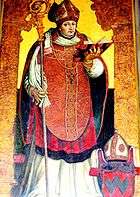Jan Chojeński
John Chojeński was a sixteenth century Polish bureaucrat and church leader.[1] and beatified person.[2]
 bp Jan Chojeński |
He was born into the Abdank noble family on 17 March 1486 in the town of Golejówku near Sieradza in Malopolska and earned a doctor of laws at the University of Siena.[3]
He was Chancellor of the Crown, and after 1526, secretary of the king.[4] bishop of Przemysl from 1531, Bishop of Plock from 1535, and latter the bishop 1537 and archdeacon of Krakow.
A trusted official of King Sigismund I the Old, he defended the privileges of the church and having a doctor of laws focused around Poland’s intellectual elite and supported many eminent humanists of his day. He founded a scholarship to honour Marcin Kromer, allowing a student to study in Padua and supported professor of medicine Joseph Ostrich.
At the The Diet Piotrkow in 1538, which dealt with restrictions on the economic rights of the Jews he made a speech demanding the expulsion of the Jews from Poland. The next day (11 March 1538) he was dead. This became the basis for devising suspicion that he was poisoned. He was buried behind the altar in the Wawel Cathedral. Currently his tombstone is in King John Albert Chapel in Wawel Cathedral (formerly Bożego Ciała).[5]
References
- ↑ Bishop Bl. Jan Chojeński at Catholic Heirachy.com
- ↑ Diocese of Plock at GCatholic.org
- ↑ Piotr Nitecki, the Bishops of the Church in Poland in the years 965-1999 in Słownik biograficzny, ed. II, Warszawa 2000, p51. ISBN 83-211-1311-7.
- ↑ Urzędnicy centralni i nadworni Polski XIV-XVIII wieku, Kórnik 1992, page145.
- ↑ Władysław Pociecha, Chojeński Jan. in Polish Biographical Dictionary . Polish Academy of Learning 1937, pp. 396-399. ISBN 8304032910.
| Religious titles | ||
|---|---|---|
| Preceded by John Latalski |
Bishop of Płock 1531 – 1538 |
Succeeded by Piotr Gamrat |